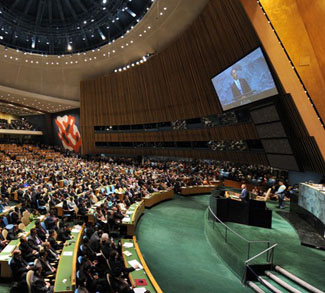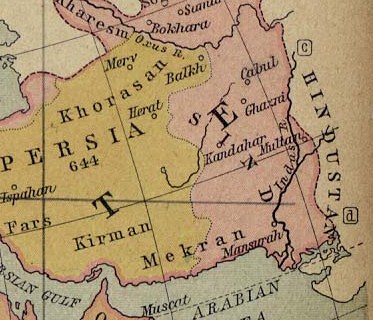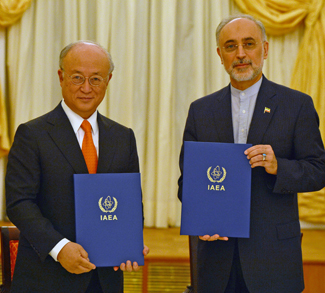This week, Will Sapp of Geopoliticalmonitor.com publishes an exclusive interview from Ottawa with Sheryl Saperia, Director of Policy for Canada from the Foundation for Defense of Democracies (FDD).
Introduction
The FDD is a non-partisan institution focusing on national security and foreign policy. FDD was founded by a group of former U.S. officials and visionary philanthropists shortly after the attacks of September 11, 2001 to help free nations defend themselves.
On February 8, 2012, Ms. Saperia, and her colleague Mark Dubowitz, addressed Canada’s Standing Senate Committee on Foreign Affairs and International Trade. Their presentation examined Canadian foreign policy regarding Iran.
In this exclusive interview, Ms. Saperia offers an incisive analysis of Iran commenting on a number of critical issues. These include the effects of economic sanctions, Canada’s foreign policy options, and the ramifications of SWIFT’s recent cancellation of Iranian bank transfers.
Interview highlights:
- Evidence points to Iran seeking capability to build a nuclear bomb
-
SWIFT’s cancellation of Iran’s bank transfers is certainly a milestone
-
Ideal scenario is that economic sanctions cause Iran to cancel its nuclear program
-
Canadian government should designate IRGC as a terrorist group
Do you believe that Iran is covertly building nuclear weapons?
The evidence at this point indicates that Iran is seeking to develop the option, that is, the capability, to build a nuclear bomb. Canada’s own intelligence service, CSIS, mentions in a recent report its belief that Iran is at a minimum seeking to acquire the capacity to produce a nuclear weapon. Perhaps most relevant is the report by the International Atomic Energy Agency (IAEA), released this past November. In it, the IAEA expresses concern about undisclosed nuclear activities in Iran involving military related organizations, including activities related to the development of a nuclear payload for a missile. The report also states that Iran had carried out activities relevant to the formation of a nuclear explosive device.
Serious intelligence agencies do not believe Iran’s claims that its nuclear facilities are for peaceful or civilian purposes such as energy. Some experts have posed this compelling question: If Iran were solely seeking energy development, then why, in the context of high inflation and unemployment, would its leaders choose to spend $1,000-$2,000 per kilowatt to construct nuclear plants instead of $400-$800 for gas, especially when they are in possession of considerable gas reserves?
Does this mean that Iran poses an existential threat to the region?
In my opinion, even a nuclear-capable Iran – which I distinguish from a nuclear-armed Iran – is extremely dangerous. Given its revolutionary nature, the Iranian regime aspires to alter the regional and even global order of power to its advantage. Nuclear weapons capability could form a protective shield around the Iranian regime and further embolden it to continue and intensify its belligerent activities towards that goal. These include assassination attempts of foreign government officials, support of terrorist groups around the world, fomenting violence in countries to weaken governments it dislikes, propping up murderous regimes that it supports like Assad’s Syria, making good on its genocidal threats against Israel, and arresting, kidnapping, torturing, and even executing its own citizens – including Iranians who also hold Canadian citizenship – on vague or unwarranted charges like “un-Islamic” activity.
Moreover, a nuclear-capable Iran would likely set in motion rapid nuclear proliferation in the region. Saudi Arabia will surely not tolerate a scenario in which it is lacking weapons or capabilities that Iran possesses. Turkey and Egypt may take similar positions. And the greater the rate of proliferation, the greater the chances that weapons-grade material could fall into the wrong hands – such as non-state terrorist groups. Adding nuclear weapons to an already tense Middle East is a frightening prospect.
Lastly, some of Iran’s leadership subscribes to an apocalyptic denomination of Shiite theology, which could increase the likelihood that they initiate a nuclear attack – even if retaliation would be devastating to the country.
Do you then think that the recent Iranian parliamentary elections will cause progressive change in Iran’s future foreign policy?
Over the years, President Ahmadinejad’s despicable positions and comments on issues like Israel, the Holocaust, and homosexuality have focused world attention and criticism on him. What the recent parliamentary elections highlight is that the real source of power in Iran is not the president, but the supreme leader – Ali Khamenei. These elections consolidated the supreme leader’s power (and weakened Ahmadinejad’s) to an even greater extent by handing the former a parliamentary majority of loyalists.
Importantly, the supreme leader is backed by the Islamic Revolutionary Guard Corps (IRGC), which continues to become more powerful and wealthy. The IRGC is in charge of the country’s nuclear program, internal human rights repression, and terrorist activities abroad. A stronger supreme leader and IRGC represent a continuation of Iran’s present foreign policy – one that seeks regional hegemony and touts greater confrontation and conflict with the West.
Worth pointing out is that while the regime boasted a high voter turnout of 64 percent, no free and independent reporting was allowed to confirm this number. There were even contrasting numbers released by government officials, leading to more suspicions of fraud. Khamenei has incentive to inflate the voter tallies: greater citizen participation in elections weakens reports of internal dissent, dissatisfaction and despair, and instead suggests widespread support for his domestic and foreign policy.
What will be the effects of SWIFT’s recent cancellation of Iranian bank transfers? Is this a milestone? Do you believe that sanctions are beginning to work?
The EU recently ordered SWIFT (the Society for Worldwide Interbank Financial Telecommunication) to prevent EU-sanctioned Iranian banks from using their service. Global financing transactions are very difficult without SWIFT, which is used by most banks. The move represents the EU’s strongest effort thus far to intensify financial sanctions against Iran in the hopes of compelling it to abandon its nuclear weapons program. The expulsion is also the first in SWIFT’s four decades of existence. FDD executive director Mark Dubowitz likens SWIFT to the financial equivalent of the United Nations. SWIFT’s cancellation of Iran’s bank transfers is certainly a milestone.
Without SWIFT, Iran’s ability to move money through the international financial system – for the purpose of selling oil or buying steel, for example – is greatly hindered. However, there are (albeit harder) ways for Iran to get around SWIFT, so this measure is unlikely to cause the requisite “pain” needed to convince the Iranian regime to back down.
Are sanctions working? They have certainly had a large impact, diminishing the value of Iran’s currency, increasing inflation, and making the sale of oil, Iran’s largest export, much more difficult. But if we define the ultimate goal of sanctions as persuading the Iranian leadership to abandon its nuclear program, then we cannot say that sanctions have worked.
However, it is only relatively recently that sanctions have been upgraded and strengthened, and more time may be required for them to have the desired effect. The challenge is whether waiting for sanctions to work gives the Iranians what they need: more time to work on their program and enter what Israel’s Minister of Defense Ehud Barak has called the “zone of immunity” – the point at which even if Israel or the US wanted to strike militarily, they would be unable to do so because the nuclear operations have been moved too far underground.
What does it mean to have successful sanctions? Can you elaborate on what you would perceive to be an ideal outcome?
The ideal scenario is to cause enough pain to Iranian decision-makers through economic pressure (such as oil and gas embargos) that a cost-benefit analysis would generate a decision to abandon the nuclear program. However, this is very unlikely. A more realistic – but still positive – outcome is to render the government vulnerable and unleash a domestic Iranian backlash that revives the internal opposition. With high inflation and unemployment, a weak rial, and current sanctions costing the government billions of dollars, the Iranian theocracy should be susceptible. A democratic revolution surpassing the 2009 protests would optimally remove the current regime, and put in its place a power structure that respects human rights at home and seeks peace and stability abroad. We would hope that this new leadership would have more interest in good relations with the West than in amassing nuclear weapons capability. But even if a new government did harbour ambitions for a nuclear program, perhaps this would seem less scary in the hands of those who abide by international protocol, who do not call for the annihilation of other sovereign countries, who do not sponsor terrorist organizations throughout the world, and who do not arbitrarily arrest, detain and torture their own citizens.
If sanctions do not “work”, would you argue that the only option remaining is the “military option”?
First, I do not believe that we have done everything possible on the sanctions front to prevent a nuclear Iran. If the West wants to avoid the military option, they must impose truly crippling sanctions. Sanctions have certainly been improving, but they are not yet strong enough to bring the Iranian economy to the brink of collapse.
Second, historical precedent suggests that only the credible threat of military force has succeeded in changing the (post-Revolution) Iranian regime’s decision-making. For example, if the US intelligence community was correct in asserting that the Iranians suspended nuclear weaponization in 2003, then this was likely out of fear that, after the toppling of Saddam Hussein’s regime in Iraq, they were next. When Iran Air flight 655 was shot down by US forces in July 1988, that act, although an accident, was viewed as an intentional act by the Iranian leadership, and this belief may have finally triggered the end of the Iran-Iraq war. To be clear, I am not advocating for a military strike. But I do believe that this option must be truly credible in order to make the Iranian regime blink first.
Third, I must take issue with those who believe it is better to accept (but perhaps contain) a nuclear Iran than engage militarily for fear that this will fuel a regional war. A nuclear-capable Iran will likely bring about a regional war anyway! And when the West is forced to get involved in this war, it will do so under tremendous disadvantage: Iran will now be operating under the umbrella of nuclear impunity.
Fourth, one could argue that Iran and the West are already at war. While we have not witnessed outright combat, clandestine warfare has been waged since the 1979 Islamic Revolution. So perhaps the more accurate question is whether full-scale armed conflict can be avoided. I hope so.
If the military option is the only option, do you think Israel will strike unilaterally? If so, then when?
While Israeli Prime Minister Benjamin Netanyahu has been vocal about keeping the military option very much alive, it is not at all clear that a decision in Israel has been made. The debate among former and present officials, not to mention the general public, is spirited and hardly homogenous.
I do not believe the Israelis will strike unilaterally unless they acquire compelling evidence that Iran is imminently penetrating the zone of immunity and believe that nobody else will take action. Israel’s allies, including Obama and Harper, have communicated a preference for diplomatic and economic pressure, rather than a military strike. Netanyahu is not oblivious to this, nor is he unaware of the potential risks of the military option: Iranian retaliation either directly or through its proxy terrorist groups (the Iron Dome will remove some of the danger, but more protection is needed), a failed venture, an Iranian decision in the aftermath of an Israeli attack to start building nuclear weapons, and from Netanyahu’s domestic political perspective – the loss of public support and subsequent election defeat.
If a military strike is ultimately deemed the only option, it is not necessarily the case that Israel will act unilaterally. In his AIPAC speech, Obama, while emphasizing that more time should be granted to allow sanctions to work, was equally adamant that he would not hesitate to use force if needed.
What would be the fallout of such a military strike? What would it mean for Iran, Israel, and the region as a whole?
The degree of success of a military strike would dictate the answer to this question. A crushing and decisive blow to Iran’s nuclear facilities could greatly weaken the regime and deprive it of retaliatory options. But there are undoubtedly risks – especially if the strike does not do sufficient damage. Iran could respond with terrorist action against Israel, the United States, or other Western countries (particularly against Jewish or Israeli targets within those countries); a spike in oil prices could detrimentally impact the global economy; Iran could attempt to block the Strait of Hormuz and attack Gulf states’ oil installations; and the current Iranian regime could encounter increased internal support united against the West.
Canadian Senator Romeo Dallaire has expressed concern over a lesser-known issue: the fate of the minority Baha’i people in Iran if, after countless state media reports accusing the Baha’i of being Zionist conspirators, Israel launches an attack.
And I recently read a fascinating article suggesting why, from a geographical perspective, Russia has so much at stake in this conflict. If a successful military strike in Iran ultimately leads to a more pro-Western regime, the substantial oil and gas reserves in countries like Kazakhstan and Turkmenistan could flow out to the rest of the world without Moscow’s control. This would do serious damage to Russia’s energy leverage over much of Europe and Turkey, and would represent a shift in the global balance of power.
What policy recommendations are you currently making to the Canadian government?
Two of FDD Canada’s policy recommendations are particularly relevant here.
First, I have maintained that if Canada is determined to deal with the Iranian threat, we must focus on the IRGC (Islamic Revolutionary Guard Corps). This entity is in charge of Iran’s nuclear program; it is responsible for severe human rights violations and for the 2009 violent suppression of Iranian protesters; it has trained and financed terrorist groups like Hezbollah, Hamas and even al Qaeda; and it has been implicated in the attempted assassination plot of the Saudi ambassador in Washington, as well as in recent attempted terrorist attacks in Thailand, India, Georgia, and Azerbaijan.
Canada’s current sanctions, which target many individuals and entities, including some associated with the IRGC, have been imposed in response to Iran’s nuclear activity. However, the IRGC is a terrorist organization, and should be designated as such under the Public Safety list of terrorist entities. Even if Iran were to cease its illegal nuclear program tomorrow, this does not alter the fact that the government has historically assigned a 9-digit budget line for international terrorism that is channeled through the IRGC. Canada needs to use every non-military tool in its toolkit at this critical time – and that includes listing the IRGC as a terrorist entity in Canada.
The second recommendation is to tighten existing sanctions under SEMA (the Special Economic Measures Act). For instance, while a Canadian company cannot do business with Iran, an overseas subsidiary of that company can. Similarly, a Canadian subsidiary can do business in Canada while its foreign parent is doing business in Iran. These serious exceptions undermine the effectiveness of our Iran sanctions.
Why are Iran and these policy recommendations relevant to Canadians?
Iran has been deemed a serious threat to global peace and security. If we are serious about confronting the Iranian threat, and if we would prefer to see a peaceful solution to the conflict, then we need to ensure all non-military measures are being effectively employed.
In the case of the IRGC, this organization poses a serious danger to the West, including Canada. Recent attacks represent a major escalation in Iran’s involvement in international terrorism and in the targeting of diplomatic missions in contravention of international law. The Guards should be added to Canada’s list of terrorist entities.
With regard to sanctions, if the purpose is to cause economic discomfort to the regime to compel them to comply with international demands, then loopholes in the system will undermine that effort and possibly increase the need for military intervention down the road. Canada (and all Western countries) should put companies and their related entities to a choice: they can do business here or in Iran but not both.
Will Sapp is a contributor to Geopoliticalmonitor.com



